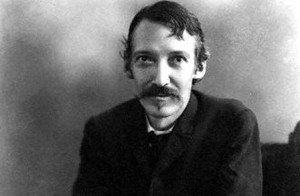I’ve been thinking a lot about boldness lately, about saying what you want to say when you want to say it. This concept of simply stating what you mean is certainly at work in “Requiem,” by Robert Louis Stevenson, one of his most well-known poems:
Under the wide and starry sky,
Dig the grave and let me lie.
Glad did I live and gladly die,
And laid me down with a will.
This be the verse you grave for me:
Here he lies where he longed to be;
Home is the sailor, home from the sea,
And the hunter home from the hill.
Stevenson clearly conveys his acceptance of death. In talking about his death, he gives commands rather than shrinking from the idea of it, with phrases like “dig the grave” (2) and “grave for me” (5). This demonstrates just how brave he is, and how at peace he is with the fact that he must die. He even says “let me lie” (2) in a show of fearlessness. This is further acknowledged with the line “And laid me down with a will” (4), which means that Stevenson is willing to go. My favorite line of the poem expresses a sentiment that I think all people should aspire to: “Glad did I live and gladly die” (3). This is a lovely way of communicating the poet’s utter contentment with the time he has spent on Earth. Because he has not regretted his mistakes or negative experiences, he is able to die happy.
When he brings up the inscription for his grave, Stevenson makes this point even more emphatically: “Here he lies where he longed to be” (6). After a long, fulfilling life, he is able to actually look forward to death in a positive way, viewing it as his next step in life, as an accomplishment. The examples he gives of the “sailor, home from the sea” (7) and “the hunter home from the hill” (8) illustrate the point that while a sailor’s “life” is spent out on the sea, or the hunter’s out on a hill, their true home is where they go when they die. “Home” is being where you are your most satisfied with the work, and other activities, you have done outside of it. And Robert Louis Stevenson, after a successful (albeit somewhat brief) literary career, died and had this poem engraved on his tomb, a mark of his victory.

 “Requiem” by Robert Louis Stevenson
“Requiem” by Robert Louis Stevenson




 “Other Side” Documents Woman’s Fight To Die As She Wishes
“Other Side” Documents Woman’s Fight To Die As She Wishes
 The Other Death in the Family
The Other Death in the Family















